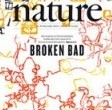A natural disaster is to blame for a retraction about lethal brain tumors. At least, that’s where the authors say the problem started: with a 2010 earthquake that caused a loss of “substantial data.”
The paper, “Superoxide-dependent uptake of vitamin C in human glioma cells,” looks at how the cells of lethal brain tumors interact with the vitamin commonly used to reduce side effects of therapies.
Post earthquake, someone digitally filled in a western blot analysis of proteins from a cell line and rat brains, as a “temporary solution.” And then the temporary solution made its way into the Journal of Neurochemistry.
Here’s the retraction note from the journal, including an image of the sneaky western blot:

 Oncogene is retracting a 2010 paper on
Oncogene is retracting a 2010 paper on 

